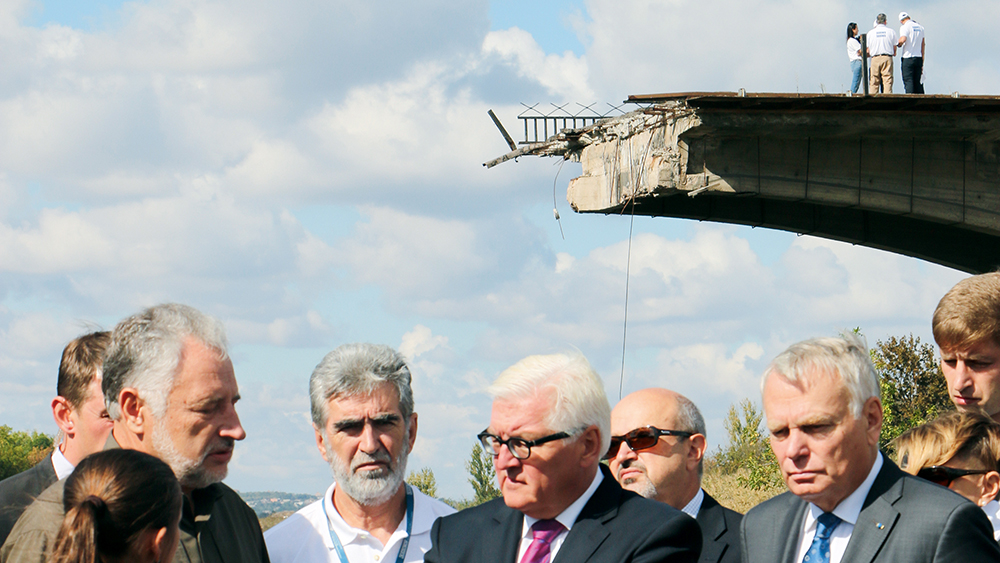Russia is the aggressor in eastern Ukraine and thus part of the problem, says Celeste Wallander, formerly senior director for Russia and Eurasia of the US National Security Council.
Germany held the OSCE presidency last year. How did Berlin perform? Performance is very dependent on structures – or rather some structural problems concerning the OSCE observer mission in Ukraine. It is one of the biggest missions, and it works on the principle of consensus. That, of course, is not very easy to find among so many members. There are also concerns over offending the Russians because that can make the institution unworkable, especially since the Russians are very sophisticated when it comes to creating bureaucratic and political obstacles. Let’s not forget that Russia is the aggressor and therefore part of the problem. When much of what the OSCE does is not based on a majority vote but rather on consensus, then Russia can block funding or prevent mandates from being renewed. There is – and that is important to understand – an institutional constraint on what the OSCE really can deliver.
Does “blocking” include preventing the proper attribution of actions by the parties involved in the OSCE reports? Yes. If you spend a lot of time reading those mission reports, you can figure out what happened. You won’t find a summary at the top, saying “there were fifty shells launched, or fifty ceasefire violations, and the analysis shows that 45 of them came from Russian-held territory.” In the reports we’d rather read that shells were coming from this side of the line, or a certain village. The evidence is there, if you are familiar with the territory and if you have a map. You would really have to go deep into the details for the reports to be usable. Most people, however, read the summary that counts the ceasefire violations without naming the violators. Very early on, it was mainly, but not only, the Russian members of the team blocking attempts at proper attribution – and that then became the norm. When Germany became chair, this practice was not changed. It was viewed as a sufficient practice because at least we had monitors on the ground. But it becomes more problematic when we see an escalation like we have in recent weeks. We’d read in the reports that Ukrainian territory was hit …
… which would make pretty clear where the shelling came from. Indeed, because it would be hard to claim that Ukrainians would shell their own territory. However, the Russians have become so good at using the reports – and the lack of “official attribution” – to blame the Ukrainians. Not that they would fool the United States with that, or certain other states. This is meant for their own audience and increasingly also for European audiences, as part of a sophisticated “fake news” campaign. They’d use the OSCE reports to report that there was shelling; they’d claim that this shelling was done by Ukrainians – and after all, the report doesn’t say that it was the Russians, does it? And they’d feed their media outlets with it, including RT and Sputnik of course, but they’d also push it on German, French, and Italian media outlets to sway public opinion in Europe. When RT Germany then publishes a story like that, they’d channel it back into Russian TV, claiming that “even German TV reported on this” – even though RT certainly is not “German TV.” Russia puts much more effort into this propaganda war because the stakes are higher for them. They put a lot of resources into this. They have no independent media. If the United States did this, The New York Times would be on this in a second.
If this is a structural problem in the OSCE mission, giving advantage to the aggressor party, why don’t we see efforts to tackle the issues? A chairman could change the process, and we have seen diplomats who were relentless in pushing the matter of attribution. Ideally, it would be great to have an executive committee that could make decisions by simple majority instead of a consensus approach. But then, you would not want to be seen as a chair who was undermining the effectiveness of the organization. It is different, of course, when there is a chair who generally is a great believer in multilateral institutions and organizations. So the problem very often seems to be that procedure is more valuable than outcome. The feeling seems to be that we have to keep the process going, even if we are legitimizing Russia’s ceasefire violations – because we can’t lose the OSCE. The problem there is: Does the OSCE then still serve its purpose in this conflict?







